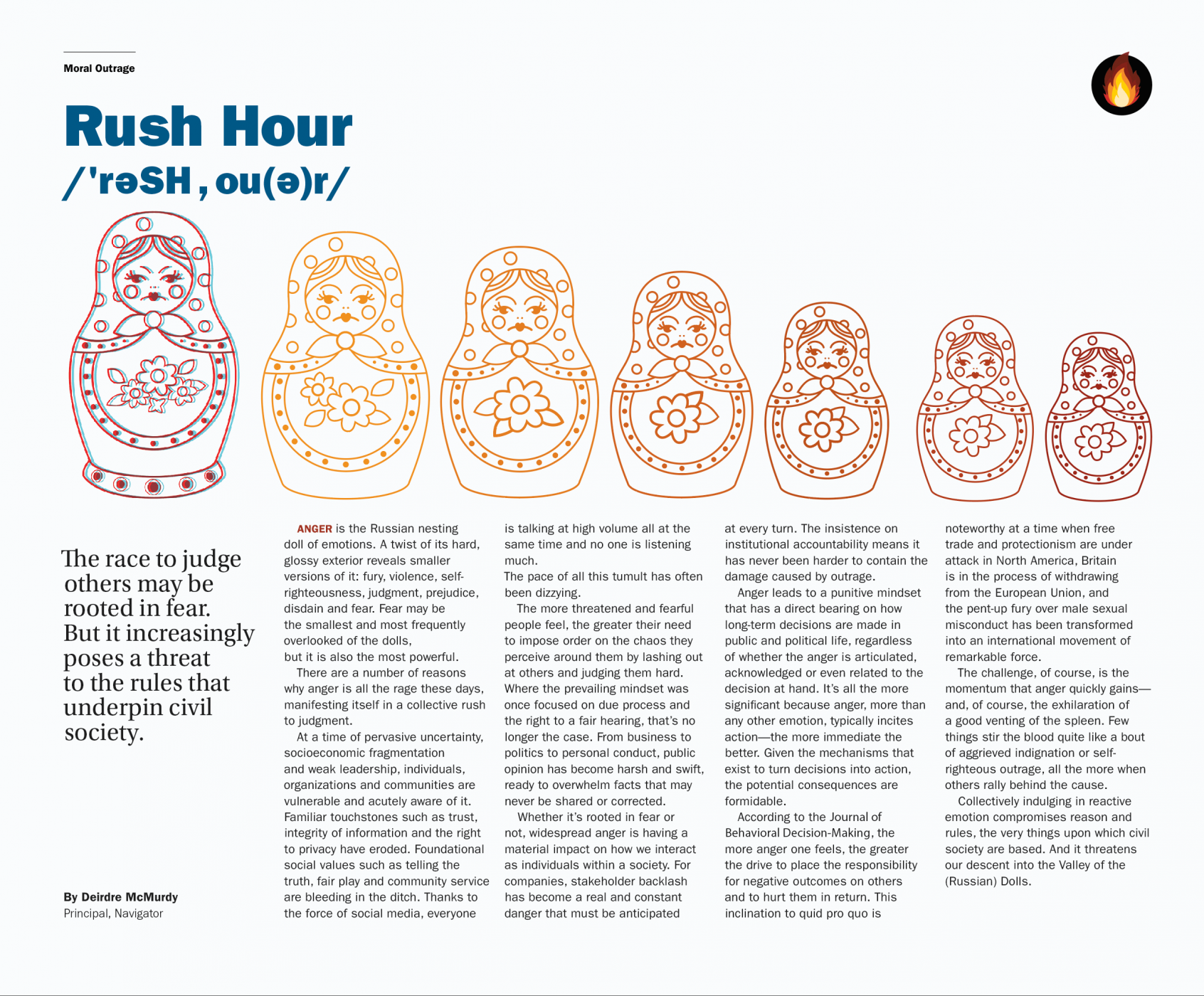- CEOCap
- Jaime Watt’s Debut Bestseller ‘What I Wish I Said’
- Media Training
- The Push Back
- Internship program
- Update Your Profile
- Homepage
- It’s time for a change
- It’s time for a change
- Kio
- Ottawa
- Art at Navigator
- Navigator Limited Ontario Accessibility Policy
- Virtual Retreat 2020 Closing Remarks
- COVID-19 Resources
- Offices
- Navigator Sight: COVID-19 Monitor
- Navigator Sight: COVID-19 Monitor – Archive
- Privacy Policy
- Research Privacy Policy
- Canadian Centre for the Purpose of the Corporation
- Chairman’s desk
- ELXN44
- Media
- Perspectives
- Podcasts
- Subscribe
- Crisis
- Reputation
- Government relations
- Public affairs campaigns
- Capital markets
- Discover
- studio
- How we win
- What we believe
- Who we are
- Careers
- Newsroom
- AI
- Empower by Navigator
- Environmental responsibility

The race to judge others may be rooted in fear. But it increasingly poses a threat to the rules that underpin civil society.
Anger is the Russian nesting doll of emotions. A twist of its hard, glossy exterior reveals smaller versions of it: fury, violence, self-righteousness, judgment, prejudice, disdain and fear. Fear may be the smallest and most frequently overlooked of the dolls, but it is also the most powerful.
There are a number of reasons why anger is all the rage these days, manifesting itself in a collective rush to judgment.
At a time of pervasive uncertainty, socioeconomic fragmentation and weak leadership, individuals, organizations and communities are vulnerable and acutely aware of it. Familiar touchstones such as trust, integrity of information and the right to privacy have eroded. Foundational social values such as telling the truth, fair play and community service are bleeding in the ditch. Thanks to the force of social media, everyone is talking at high volume all at the same time and no one is listening much.
The pace of all this tumult has often been dizzying.
The more threatened and fearful people feel, the greater their need to impose order on the chaos they perceive around them by lashing out at others and judging them hard. Where the prevailing mindset was
once focused on due process and the right to a fair hearing, that’s no longer the case. From business to politics to personal conduct, public opinion has become harsh and swift, ready to overwhelm facts that may never be shared or corrected.
Whether it’s rooted in fear or not, widespread anger is having a material impact on how we interact as individuals within a society. For companies, stakeholder backlash
has become a real and constant danger that must be anticipated at every turn. The insistence on institutional accountability means it has never been harder to contain the damage caused by outrage.
Anger leads to a punitive mindset that has a direct bearing on how long-term decisions are made in public and political life, regardless of whether the anger is articulated, acknowledged or even related to the decision at hand. It’s all the more significant because anger, more than any other emotion, typically incites action—the more immediate the better. Given the mechanisms that exist to turn decisions into action, the potential consequences are formidable.
According to the Journal of Behavioral Decision-Making, the more anger one feels, the greater the drive to place the responsibility for negative outcomes on others and to hurt them in return. This inclination to quid pro quo is noteworthy at a time when free trade and protectionism are under attack in North America, Britain is in the process of withdrawing from the European Union, and the pent-up fury over male sexual misconduct has been transformed into an international movement of remarkable force.
